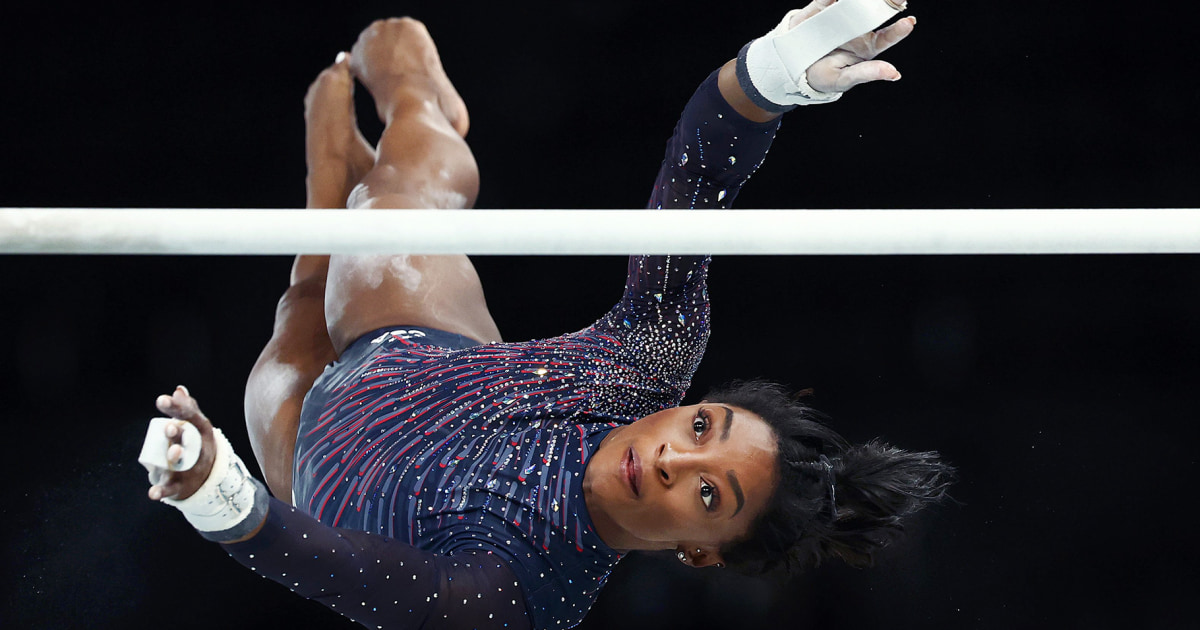China takes first gold medal of Day 2
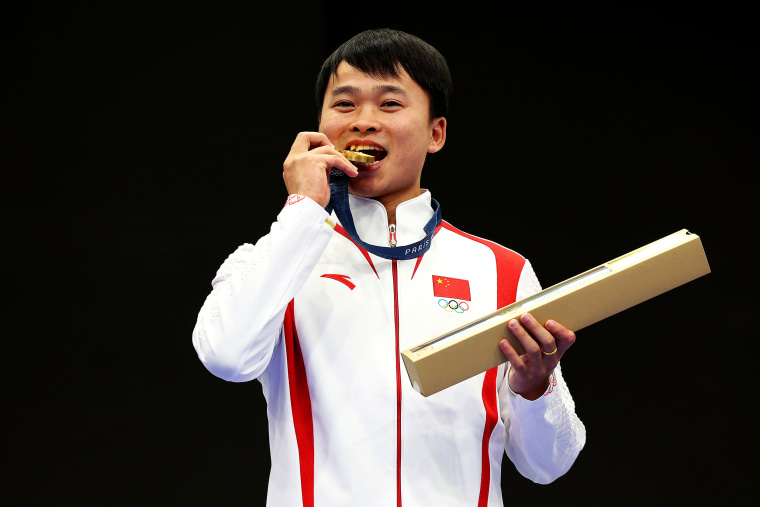
Much like yesterday, the first gold medal of the day has been won in shooting by China.
Xie Yu took gold in the 10m men’s air pistol event this morning, with Italy taking both silver and bronze.
Triathlon practice swim cancelled due to Seine water quality
Much has been made of the water quality of the River Seine in the build-up to the Games, with Paris Mayor Anne Hidalgo taking a dip herself to prove the water is safe.
However, after two days of heavy rain in the French capital, the Seine failed water quality tests, and organizers have been forced to call off the familiarization swim for the triathletes.

“Paris 2024 and World Triathlon reiterates that the priority is the health of the athletes,” organizers said in a statement, but went on to express optimism. “Given the weather forecast for the next 48 hours, Paris 2024 and World Triathlon are confident that water quality will return to below limits before the start for of the triathlon competitions.”
However, if the Seine fails to meet standards, then the triathlon will likely be delayed by a few days to see if conditions improve. If the Seine still doesn’t meet World Triathlon standards, then the event would become a duathlon, scrapping the swim.
The men’s triathlon is due to happen on Tuesday with the women’s following a day later.
Day 2 is underway, and there are blue skies in Paris!
After two days of constant rain, we finally have blue skies in Paris as Day 2 of the Games gets underway with 13 sets of medals set to be awarded Sunday.

Already this morning we’ve seen the beach volleyball prelims, now basking in the sunshine, continue under the shadow of the Eiffel Tower, while the women’s gymnastics qualifiers are also underway — Simone Biles and Team USA are due up in the second grouping of the day at 5:40 a.m. ET (11:40 a.m. local time).
Sports seeing their first action of the Games Sunday include sailing and skateboarding, and tonight’s swimming finals are set to be headlined by France’s poster boy Leon Marchand, who will be looking to end the host’s 12-year gold medal drought in the pool, and Team USA Gretchen Walsh, who has qualified fastest in the women’s 100m butterfly.
Have you noticed the French tradition brought to the Games?
You may have spotted before the start of a session at the Olympics an unusual ritual of someone banging a stick on the ground. Why is that?
It’s a tradition that originates in classical French theatre called “les trois coups,” or the three blows in English.
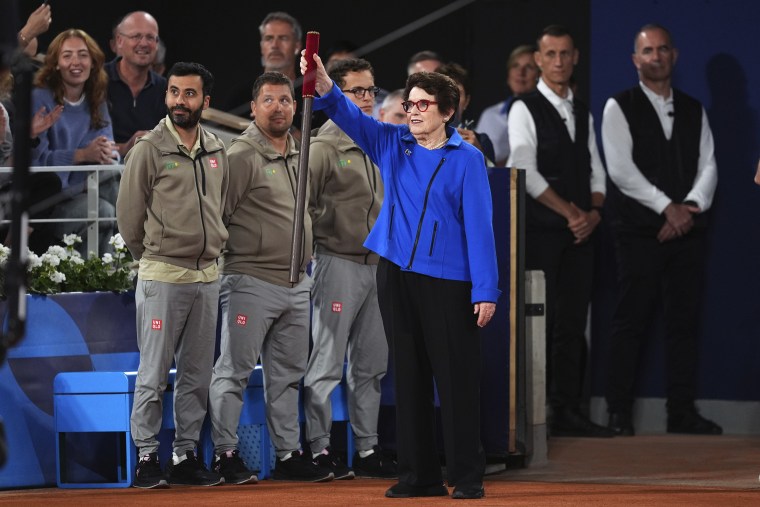
A carved wooden baton, called a brigadier, is tapped on the ground three times to grab the audience’s attention for the rising of the curtain and allows the crowd to prepare for the show that is about to come.
The custom has translated over to the Games with prominent former athletes, officials and volunteers given the honor of giving the three blows before the start of a session. At Roland Garros last night, American tennis icon Billie Jean King got the evening tennis session underway with les trois coups.
What is the two-per-country rule?
In gymnastics, only the top two finishers from each country can qualify to individual finals such as the all-around and apparatus finals.
Longtime Olympic fans may recall the dramatic qualification round from the London 2012 Olympics, when reigning world all-around champion Jordyn Wieber was eliminated from the Olympic all-around final because she was outscored by her teammates, Gabby Douglas and Aly Raisman.
Wieber technically qualified in fourth, but the two-per-country rule took her out of contention. Biles, Lee or Chiles could face similar heartbreak today.
How to watch
Stakes are high in women’s gymnastics qualifications
Although no medals will be awarded in the qualification round, mistakes made in today’s competition have the power to devastate Olympic dreams.
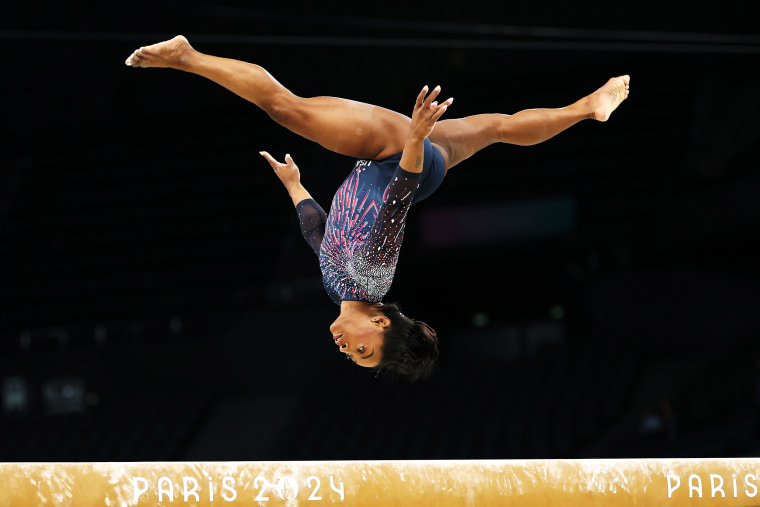
The top eight teams will move onto Tuesday’s women’s team final and the top eight individual finishers on each event advance to the apparatus finals. In the individual all-around, the top 24 finishers qualify to the finals.
Because one bad qualification routine could take a gymnast out of the all-around, apparatus or even team finals, an ill-timed error in this round of competition tends to produce a ripple effect of heartbreak.
Gymnastics scoring 101
Scoring in gymnastics has changed significantly since the days of Nadia Comăneci and her illustrious “Perfect 10.” The current scoring system can seem less intuitive than the previous one to audiences who do not follow the sport between the Olympic Games.
The Perfect 10 still exists in gymnastics, but it is no longer the only metric used to calculate a score. Today’s gymnasts receive scores in two separate categories for each routine: difficulty and execution. The difficulty score is open-ended, while execution is scored out of a 10.00.
The difficulty and execution scores are combined to produce the final number. To optimize their scores, gymnasts perform the most difficult routines they can while minimizing execution deductions.
Here’s an in-depth guide to gymnastics scoring and what makes Simone Biles so good.
USA Fencing phenom makes Olympic debut in individual foil
Lauren Scruggs is up for the USA in the women’s individual foil table of 32. She will be competing against Singapore’s Amita Berthier.
Scruggs is one of two Black U.S. fencers — male or female — to win an individual title.
This is Scruggs’ Olympic debut. She won bronze at the 2024 Washington, D.C., Grand Prix, qualifying her for the Olympics. A rising senior at Harvard, she is the 2023 NCAA foil champion and the 2024 foil runner-up, losing to her Harvard teammate, Canada’s Jessica Guo.
Guo is up against Chile’s Arantza Inostroza in this round.
Also competing in the individual foil table of 32 are the USA’s Lee Kiefer and Jacqueline Dubrovich.
Russian gymnasts won’t defend their Tokyo title
The Russian women’s gymnastics team, who are the reigning Olympic champions, will not compete in the Paris Games due to the ongoing war in Ukraine.
That leaves the team medal podium wide open for teams like the U.S., China, Brazil and Italy.
Swimmer Léon Marchand’s cold call email could end in homegrown Olympic glory
Former Arizona State University swimming coach Bob Bowman might have spiked a random email that showed up in his inbox four years ago if the sender’s name hadn’t rung a bell.
Marchand?
“Thinking back when I first got that email, the first thing I thought was, ‘Marchand? Xavier Marchand?’” Bowman said recently of his prized pupil, Léon Marchand, and his father, Xavier Marchand, a two-time French Olympic swimmer. “I thought about his dad. I wonder if they are related and they were, of course.”
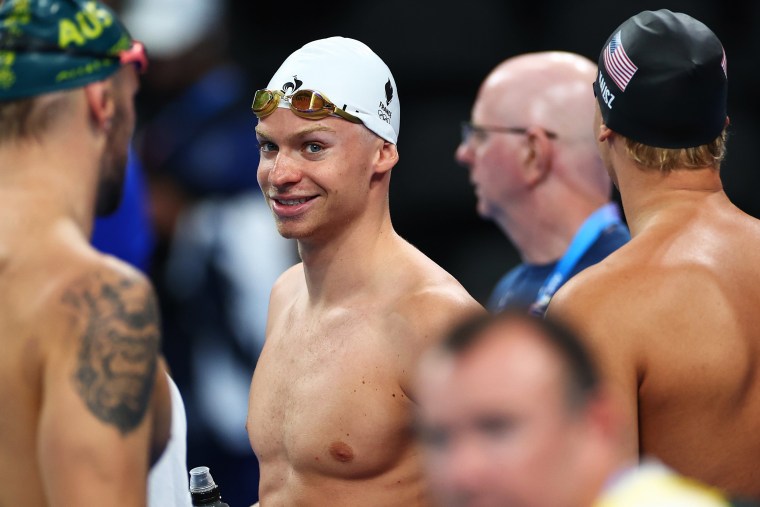
Bowman, best known as the coach of all-time swimming great Michael Phelps, did some quick research to find out who this young, emailing stranger was.
Soccer highlights: USWNT’s Naomi Girma shines on the pitch
Meet Naomi Girma, the first ever player of Ethiopian descent to play for the USWNT. You’ll see her playing defense on the Paris pitch.
“I feel really optimistic for this group and how quickly we can learn and adapt,” Girma, 24, told NBC News.
When she was growing up, she said her Ethiopian father, who loves soccer, started a soccer club for Ethiopian kids in the Bay Area “to come together and play.”
She said winning the gold would mean a lot “not just to me, but to my family, my community.”
“I just feel like I’ve had a lot of people supporting me, backing me along the way,” she said, “and I wouldn’t be here without them so I think it would just be an incredible feeling for all of us.”
What are the different types of fencing swords?
Fencing uses three different weapons: epee (or épée), foil, and saber. While they share a lot of basic rules, differences between their shapes and target areas change the speeds and styles of fencing matches. If you’re new to the sport, here’s a breakdown of the three weapon types:
- Foil is the smallest and most lightweight weapon. Foil fencers also target the smallest area — the torso — using only the tip of the blade. Scoring is largely based on how the point was made correctly, so you might think of foil as the most technical of the three.
- Epee uses only the blade’s point like foil does, but is a much larger and heavier weapon. The whole body is a valid target — the goal is to hit and not get yourself hit. Fencers must carefully choose their moments to strike while positioning themselves strategically, before they jump into action to get a “touch,” or a valid hit.
- Saber hits not only with the tip but also the edge of the weapon, in a slashing motion, that targets everything from the waist up, including the head. These matches are usually the fastest, involving swift exchanges of movement and rigorous footwork.
In foil and saber, there’s a “right of way” rule that doesn’t apply in epee. Whoever begins an attack first takes the right of way and only that fencer may score. If both players hit at the same time, it’s up to the referees to decide who initiated the move.
There is no definitive “most difficult” or “best” weapon, though every fencer has their preference. Foil is often used as an introductory weapon to teach blade control and right of way, but that doesn’t make it any easier to strategize against your opponent.
Lydia Jacoby thought an Olympic gold medal would change her life. It did — but in unexpected ways.
U.S. Olympic swimmer Lydia Jacoby was on top of the world.
At the 2020 Tokyo Olympic Games, she won the gold medal in the 100-meter breaststroke after having recorded the fastest time ever achieved by a female American swimmer (1:04.95).
But shortly after she returned home to Alaska, Jacoby, then 17, discovered in real time how her life had changed from being an obscure athlete to being famous worldwide.
In a conversation on NBC’s “My New Favorite Olympian” podcast, Jacoby detailed the challenges of experiencing depression.

